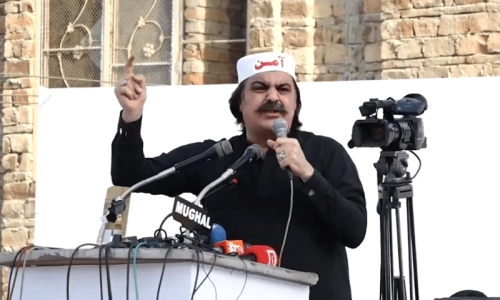Shafqat Hussain hanging postponed for fourth time

KARACHI: Death-row prisoner Shafqat Hussain was given a last-minute reprieve after his execution was stayed a fourth time late Monday night, sources at Karachi Central Prison told Dawn.
Shafqat was arrested and sentenced to death in 2004 for the kidnapping and involuntary murder of a seven-year-old boy, who lived in a Karachi apartment building where he worked as a security guard. But his execution orders have been criticised by human rights organisations and civil society representatives after doubts over his age at the time of sentencing surfaced.
International bodies such as Amnesty International and United Nations have also been pressuring authorities into halting Shafqat Hussain's execution.
On Friday, a group of United Nations human rights experts, in a last ditch effort, urged the Pakistani authorities to halt Shafqat Hussain's execution — scheduled for June 9, 2015 — who was convicted for a crime reportedly committed as a child.
All courts in the land had turned down Shafqat's appeals and the Supreme Court threw out a review petition that was the first to raise the matter of his juvenility at the time of arrest, maintaining that this line of defence should have been introduced at the trial court level.
Previously, Shafqat's legal team insisted that his earlier defence attorneys did not plead his case competently, which was why this aspect was overlooked in the past.
Just over two months ago, before Shafqat was scheduled to be executed, he was granted a last-minute reprieve and Interior Minister Chaudhry Nisar Ali Khan had ordered an inquiry into the matter to establish the veracity of the lawyers’ contention that Shafqat was a minor at the time of sentencing.
The case also garnered a lot of attention on social and mainstream media and became a bone of contention between supporters and opponents of the death penalty.
Last month, an executive inquiry to determine whether Shafqat was a juvenile at the time of his sentencing concluded that he was 23 years old when the punishment was handed down.
Take a look: FIA inquiry concludes Shafqat ‘wasn’t a minor’
According to the text of the report, seen by Dawn, a three-member Federal Investigation Agency (FIA) inquiry team, led by Deputy Director Gulfam Nasir Warraich, had found “absolutely no contradiction in the record (which includes his pictures at the time of arrest) that Shafqat Hussain was 23 years of age at the time of arrest”.
Shafqat had been due to face the noose on January 14 but the government halted the execution amid protests about his age, and ordered an investigation.
Explore: Shafqat's execution stayed for 30 days, jail authorities tell ATC.
He was then set to be executed on March 19 but a day before the sentence was to be carried out, civil society representatives gathered in front of the presidency against the order. The hanging was subsequently postponed for 72 hours and then for 30 days.
Death warrants for Shafqat Hussain were issued for the third time on April 24 after an executive inquiry by the Federal Investigation Agency concluded that he was 23 years of age when the punishment was handed down.
But a day before his execution on May 6, the Islamabad High Court stayed his hanging until a verdict was issued on a petition filed by the Justice Project Pakistan (JPP), which called for a judicial inquiry into the age of the death row convict.
Read: Shafqat Hussain's execution delayed for third time.
Eventually, the court dismissed JPP’s petition seeking his age verification to avail the benefit of Juvenile Justice System Ordinance.
An anti-terrorism court in Karachi on June 1 issued fresh death warrant for Hussain, ordering his execution on June 9.
Superintendent Central Jail Karachi wrote a letter to the judge of ATC III, saying that the stay period of Shafqat's execution was over, and therefore a black warrant be issued for the hanging of the death row prisoner.
ATC III judge issued a death warrant for the condemned prisoner with directives to hang him till death on June 9 at 4:30 am under the supervision of a judicial magistrate, and submit a compliance report after executing him.













































